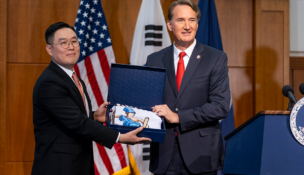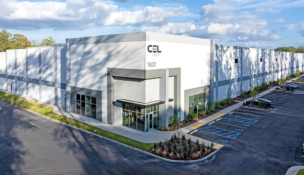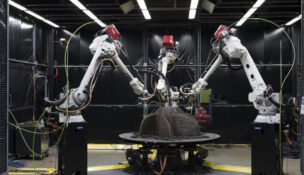Scoring a save
Suffolk hustles to keep Lipton Tea plant and its 300 jobs
Joan Tupponce //February 28, 2014//
Scoring a save
Suffolk hustles to keep Lipton Tea plant and its 300 jobs
Joan Tupponce //February 28, 2014//
Kevin Hughes was surprised to learn that, after having a Lipton Tea plant in Suffolk for 58 years, its owner was considering relocating to another city as it reinvested in its product line. A 2010 telephone call from the company started Hughes, the city’s director of economic development, on a 2½-year quest to keep the company in the city.
The Lipton plant, which has 300 employees, produces 6 billion tea bags a year, nearly all the tea bags it sells annually throughout North America. It was one of London-based Unilever’s first U.S. factories to achieve “zero-to-landfill” status in reducing waste and was a pilot site in installing LED lighting, which reduces energy consumption. Since the Suffolk plant opened in 1955, the company has consolidated its production there.
In making a decision about the Suffolk plant, Unilever wanted to look at all of its options to determine which move would make the most sense economically.
The company had several options, including relocating the plant to Kentucky, North Carolina or South Carolina, states with Unilever facilities. Another option being considered was to build a production facility in Latin America where the company purchases its teas.
The final option was to stay in Suffolk. “They wanted to see if they could be more efficient with their production,” Hughes says. “We heard them loud and clear.”
As they talked about how best to keep the plant in Suffolk, city leaders considered two scenarios. “Since they were so interested in the efficiency side, we offered them … some land opportunities that we controlled if they wanted to build a new facility,” Hughes says.
The city also looked at the deal from an incentive standpoint — how it could encourage an investment in new equipment. It had been taxing the plant’s machinery since 1955.
The city enlisted the aid of the Virginia Economic Development Partnership and the Hampton Roads Economic Development Alliance to secure the project. In the final deal, the city offered Unilever $3.7 million in phased-in local incentives to help with taxes on new equipment. In addition, then-Gov. Bob McDonnell approved a $1 million performance-based grant from the Virginia Investment Partnership program, an incentive available to existing Virginia companies.
Waiting to hear whether the company accepted the deal was difficult, Hughes says. “You know the project is out there, and you have to sit and wait. The toughest part is being patient.”
Unilever looked at different proposals. “They knew what they wanted to do, but it was always evolving,” Hughes says. “We had to keep up with them and stay in the conversation. We had to be proactive.”
The city was able to provide a response to every question the company asked. Hughes, City Manager Selena Cuffee-Glenn and Mayor Linda Johnson traveled to Unilever’s U.S. headquarters in New Jersey to meet with executives and present Suffolk’s proposal. One of the advantages to staying in Suffolk was the plant’s proximity to the Port of Virginia. The company imports loose tea through the port from various countries. That factor, along with the area’s high-quality existing workforce, low cost of doing business and an attractive incentive package, helped Unilever make its decision to stay in Suffolk.
The end result: Unilever decided to invest $96.2 million to expand and upgrade its plant in Suffolk. The company is in the first year of a six-year project.
In addition to 300 jobs, Suffolk would have lost at least $600,000 in annual tax revenue if Lipton had moved out of Suffolk. “This is one of the most rewarding projects I have worked on, a facility that has such a long tradition in the city,” Hughes says.


















